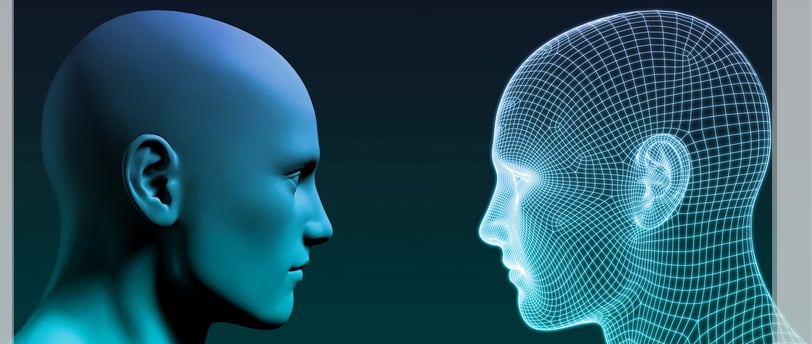Human vs AI Virtual Assistant


Navigating the ever-evolving landscape of virtual assistance, it's evident that human virtual assistants stand tall as the superior choice. While AI has achieved remarkable advancements, there exist distinctive qualities that render human virtual assistants unparalleled. Within this discourse, we shall delve into the merits and drawbacks of both virtual assistants and AI, as well as offer guidance on determining the optimal choice.
The Advantages of Human Virtual Assistants
Emotional Intelligence and Empathy
Distinguishing human virtual assistants is their possession of emotional intelligence and empathy. Unlike AI counterparts, humans possess an innate ability to comprehend emotions, perceive nuances, and respond with authentic empathy. When dealing with personalized outcomes or intricate scenarios, the empathetic nature of a human virtual assistant shines through. Their capacity to genuinely listen, troubleshoot, and provide personalized guidance is unrivaled.
Adaptability and Critical Thinking
AI systems excel at predefined tasks, yet they falter when confronted with ambiguity or intricate situations. This is where human virtual assistants truly shine. Their adaptability and critical thinking enable them to tackle multifaceted challenges with finesse. They analyze situations, think creatively, and devise bespoke solutions that transcend rigid algorithms. Whether it's resolving issues, managing customer interactions, devising strategies, or making decisions, human virtual assistants embody an agility and resourcefulness that AI cannot replicate.
Natural Language Fluency and Communication
Language transcends technical correctness, requiring nuanced expression. Human virtual assistants excel in communication, adeptly navigating cultural subtleties, idiomatic expressions, and even humor. Their natural language fluency empowers them to engage in meaningful dialogues, comprehend context, and modulate their tone accordingly. Whether crafting compelling content, handling customer interactions, or conveying intricate concepts, human virtual assistants infuse a higher level of authenticity and individualization.
Building Trust and Long-Term Relationships
Trust underpins successful relationships, an area in which human virtual assistants excel. The human element fosters trust and reliability beyond the grasp of AI. Through consistent interactions, human virtual assistants develop a deeper understanding of preferences, needs, and unique circumstances.
Security and Privacy Considerations
The advent of AI has sparked security and privacy concerns. AI relies on data, encompassing personal information such as location, communication patterns, and even emotions. Consequently, the risk of personal data misuse, malevolent leaks, or cyber theft looms.
A proficiently trained human VA comprehends safeguarding personal data and ensuring confidentiality. This is especially crucial when discussing sensitive or confidential matters, such as in medical or legal contexts.
Challenges of Collaborating with Human VAs
Collaborating with human VAs presents challenges. They can be costlier to hire and retain. Moreover, training human VAs to excel in their roles entails additional costs and time. Challenges also include scheduling conflicts and interpersonal clashes.
The Merits of AI
On the other hand, harnessing AI furnishes unique benefits absent in human assistants. AI operates ceaselessly, providing 24/7 support for emerging issues. AI rapidly analyzes vast datasets, furnishing real-time insights and recommendations. Moreover, AI continually advances, with tools frequently introducing fresh features and capabilities.
Selecting the Optimal Approach for Your Enterprise
Ultimately, the choice between AI and human virtual assistants hinges on individualized needs and preferences. While AI offers convenience and efficiency, human virtual assistants deliver personalized and secure experiences. By comprehending the rewards and risks inherent in each approach, business proprietors can make well-informed decisions regarding safeguarding private data and obtaining necessary support.
When deciding between AI and human assistance for your enterprise, meticulous consideration of your particular requirements and objectives is paramount. The following questions can aid your decision-making:
How can a VA or AI tool optimally uphold your business's core values and mission?
What tasks will your VA undertake, and how intricate and personalized are they?
Do you need a virtual assistant accessible around the clock, or is assistance limited to specific hours or days?
What level of security and privacy is requisite for your VA's tasks?
Do you anticipate substantial customer interactions, and if so, can an AI system manage such engagement?
Should you choose a blended or AI approach, ensuring a human touch for customers is vital. Additional training for VAs equips them to manage intricate customer inquiries promptly. Employing diverse communication tools, such as chatbots, voice assistants, and social media monitoring, caters to customer preferences.
Ultimately, the selection between AI and human virtual assistants is contingent on your enterprise's unique requisites and aspirations. With a strategic approach, either avenue can yield substantial benefits, propelling your business to thrive.


